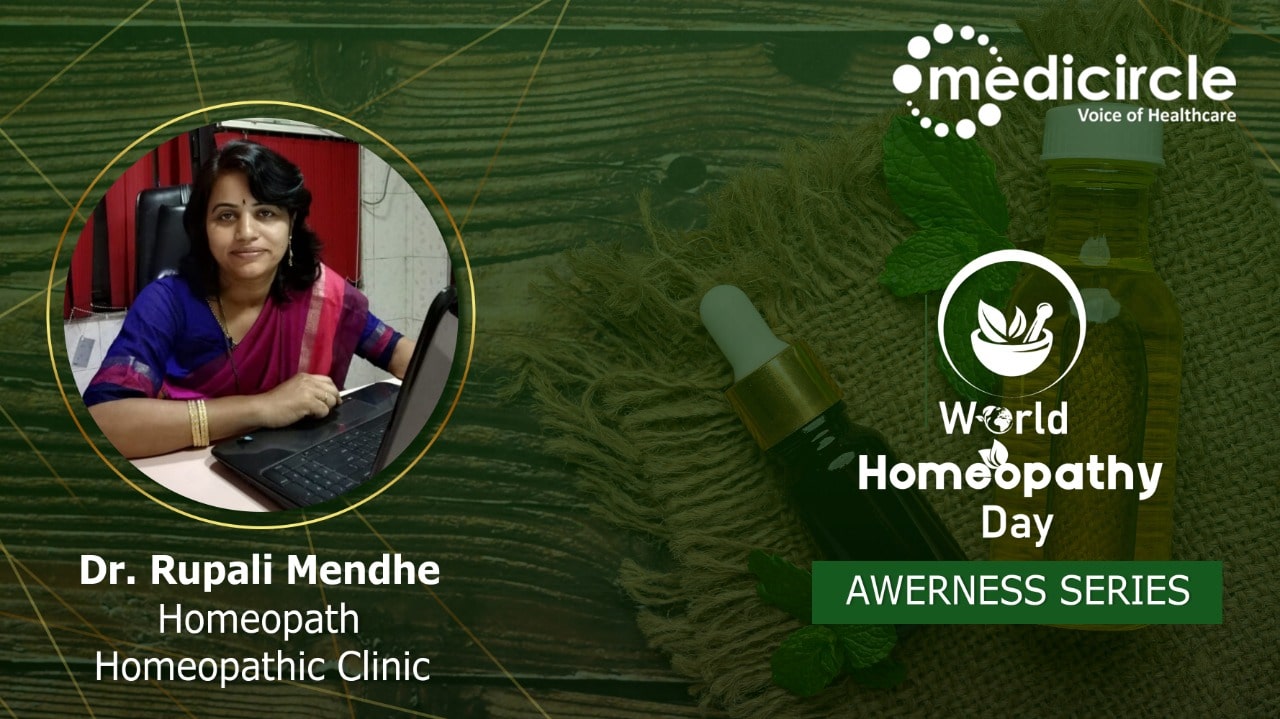Homeopathy is a medical system that was developed almost 200 years ago. It is based on the medical philosophy that the body can heal itself. It is a natural form of medicine used by people worldwide to treat both acute and chronic conditions. Medicircle is conducting World Homeopathy Day Awareness Series to help educate people about this natural and preventative therapy.
Dr. Rupali Mendhe is a leading homeopath practicing in Airoli, Navi Mumbai with 20 years of experience in the field of homeopathy. She provides homeopathic treatment for all ages and stages in life. She is specialized in treating a wide variety of psychological disorders and physical ailments.
Homeopathy – fast or slow action therapy?
Dr. Rupali explains whether homeopathy is a fast or slow action therapy by use of a real-life example. She mentions that many years ago she had gone to her cousin’s wedding in a village. A little boy who had come to the wedding started suffering from severe amoebic dysentery with blood and mucous. The village was in interiors and reaching the nearest hospital required two hours of travel. Parents of the child naturally panicked but she told them to just give her 30 mins. She was carrying homeopathic medicine with her and gave it to the child. To the happiness of the parents, the child started showing improvements within 30 minutes itself. Mucous in the stool disappeared in 2-3 hours and he started asking for normal food within 6 hours and became completely active. He was able to attend the wedding as well. “Looking at this real-life example, it's upon you to judge whether homeopathy is fast or slow,” says Dr. Rupali.
Homeopathy gives sure-shot relief in acute cases
Dr. Rupali mentions, “In acute cases like fever, dysentery, cough, etc., homeopathy is surely going to provide relief. However, if there are some chronic cases like sclerosis or eczema etc., patients come for homeopathic treatment after having gone for multiple other treatment options before. So the impact of homeopathy is a little slow in such cases as the disease is already prolonged by the time it reaches the homeopath. Still, homeopathy starts taking the patient from discomfort to comfort zone in 2 weeks in cases like eczema etc., the itching gets reasonably down. This is the framework on which homeopathy works - to gradually remove the discomfort of patients and bring him or her to the comfort zone. So homeopathy can be slow in chronic cases depending upon how prolonged the disease is,” says Dr. Rupali.
There are no side effects of homeopathy
Dr. Rupali says, “The medications of homeopathy are drawn from the plant and animal kingdom and not chemicals. Hence there are no side effects of homeopathy. But care should be taken to go to the proper practitioner or homeopath and not just anybody to find the right solution.”
Whether allopathic drug should be stopped when one is taking homeopathic medicine, depends upon individual conditions
Dr. Rupali informs, “In my 20 years of practice, what I have seen is that people come to homeopathy after having done immense treatment in allopathy and hence there is a dilemma whether at all homeopathy would be able to help now. We try to build confidence in such people that homeopathy would work. If patients begin treatment with this mindset, it would surely help. Stopping allopathic drugs depends upon the ailment. If the patient has come for rheumatoid arthritis, I would stop allopathic drugs in such cases. But my strategy is not to stop allopathy drugs immediately for ailments from which patients are suffering for a long period like diabetes, blood pressure, cholesterol, etc., and especially if the patient is coming for other ailments like arthritis or pain on the heels. Allopathic drugs can be stopped gradually depending upon the individual and ailment,” says Dr. Rupali.
Focus on individualization as well as non-verbal communication along with words
Dr. Rupali mentions, “Before arriving at a treatment plan, we do a full observation of the patient by paying attention to not only verbal but non-verbal communication as well like how the person is expressing his ailment to come to the accurate understanding of the patient’s problem. Homeopathy looks at the mind and body connection and that is part of our observation. Homeopathy focuses on individualization. Focus is on the “whole being” and not only the organ that is suffering. Whenever we interact with patients in our follow-up sessions also, we focus on “how the person is feeling on the whole” and not just the part of the body that is giving him trouble,” says Dr. Rupali.
(Edited by Amrita Priya)

 In homeopathy we do a full observation of the patient by paying attention to not only verbal but non-verbal communication as well like how the person is expressing his ailment to come to the accurate treatment plan – Dr. Rupali Mendhe, Homeopath.
In homeopathy we do a full observation of the patient by paying attention to not only verbal but non-verbal communication as well like how the person is expressing his ailment to come to the accurate treatment plan – Dr. Rupali Mendhe, Homeopath.










.jpeg)


.jpg)






.jpeg)

.jpg)




.jpg)




.png)

